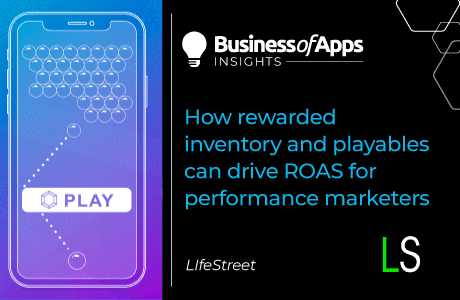To build your game’s audience in today’s increasingly competitive market, it’s critical to scale your user acquisition (UA) campaigns. But, with Apple’s IDFA changes and an uncertain economy restricting advertisers’ ability to accurately measure campaign performance, predicting ROAS and scaling your UA has become more challenging than ever.
In this article, we suggest ways to optimize your UA strategy for enhanced scale and user lifetime value (LTV) by working with trusted DSP partners.
The value of DSPs in today’s market
With nearly 478,000 games available today on the Google Play store (up 6% from Q1 2022), the mobile gaming marketplace is more competitive than ever. Furthermore, Apple’s IDFA changes have diminished the measurability of mobile marketers’ campaigns, making it harder for them to optimize their ad spend to compete.
How can game developers confront this? By working with DSPs that have privacy-compliant, first-party data and innovative machine-learning models to enhance UA campaigns.
Here’s why DSPs are particularly well-positioned to use privacy-compliant signals to scale UA campaigns in today’s mobile marketplace.
DSPs have unique data to build custom models
DSPs can leverage data science and bidding technology to scale UA campaigns. These capabilities have gained even more value since the near-deprecation of the IDFA. With less campaign measurability, using technology to stretch the privacy-compliant data that is available as far as possible has become critical.
To do this, advanced DSPs create custom models that use a game app’s data to build campaign strategies tailored to their specific needs. For example, an advertiser might determine that when a player reaches Level 10 in a game, they have a higher likelihood of becoming a payer. If the advertiser then passes this Level 10 data to their DSP partner, they can create a model with custom “level-reached” signals that can be used to more accurately predict the likelihood a player will become a payer.
To take advantage of a DSP’s data science capabilities, remember that the more data you feed into your models, the more the models can do. As long as the data collection methods are adherent to compliance restrictions, there is no such thing as ‘too much data’. Never underestimate the value of passing as much data as possible to your DSP partner.
DSPs have access to a large inventory of apps
One of the key advantages of DSPs is their access to a wide array of apps across the mobile ecosystem. This access can be critical to an app campaign’s success as it unlocks the potential of finding high-quality users in new and existing apps that an app hasn’t purchased in before. To tap into scale, an app has to tap into a large inventory of apps, which game developers can do through DSPs.
DSPs can help find new pockets of inventory
The first step to scaling a game effectively is doing the appropriate groundwork. This groundwork includes analyzing your target audience and being deliberate with your exploration. DSPs might have access to an immense volume of apps, but this doesn’t mean they’re buying in all of them. To scale, DSPs can create a custom exploration strategy that identifies high-quality pockets of users in specific apps across the mobile ecosystem. From here, they can test out spending an app’s initial campaign budget to build an effective pool of users from which to train their data models.
The future of UA
As we look forward to what’s to come in the ad tech industry, here are some changes to keep in mind as you scale your UA strategy.
Continued enhancements to user privacy
Eighteen months after Apple launched iOS 14.5, and with the deprecation of GAID (Google Advertising ID) and tracking cookies on the horizon, user privacy is a clear priority. Further policy and regulatory decisions will determine where the industry goes next, and the extent to which advertisers have to sacrifice the efficiency of their UA campaigns to adhere to compliance restrictions.
Despite the scope of the privacy changes mobile advertising has already experienced, advertisers should be conscious of future regulation. They should also be prepared for future restrictions by collecting as much first-party information as they can and investing in growth strategies that are not dependent on device-level signals.
The rising value of creatives
While the deprecation of the IDFA has resulted in less measurable data, the arena in which advertisers continue to maintain a strong level of control is over their creatives. By designing a large range of engaging creatives — and continuously testing them to ensure optimal performance — advertisers can give their UA campaigns a competitive edge.
The need for contextual signals
The most profound impact that advertisers have to prepare for going forward is not knowing an individual user’s potential LTV. This will greatly affect marketers’ decision-making abilities when it comes to scaling their UA, as there will be a greater degree of uncertainty over a specific channel’s potential profitability. To confront this, partnering with programmatic DSPs that can use privacy-compliant data points to execute contextual targeting will be key. Contextual targeting matches ads with impressions to accurately predict the probability of an engagement. It helps advertisers determine the most cost-efficient amount to bid for each impression and also iterate performance over time.
The sky’s the limit
As the saying goes: “If you want to go fast, go alone. If you want to go far, go together.” While building and managing the custom solutions needed to scale UA campaigns might have been efficient pre-iOS 14.5, in today’s increasingly competitive landscape, it’s not. This is where the value of independent DSPs that can build effective campaigns from advertisers’ performance data and spending information comes in. In the new world of privacy-compliant UA, working with DSP partners you can trust will be key to successfully scaling your game.












